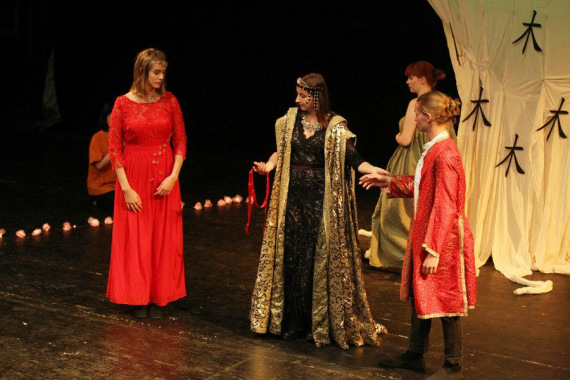
A Midsummer Night's DREAMING Under the Southern Bough made a splash in Beijing Tuesday. Students from the University of Leeds performed a contemporary adaptation based on the Chinese ancient play Nanke Ji. (Photo/China Daily)
GOING GLOBAL
Steve Ansell has his theory about how Shakespeare gained popularity around the world.
"He was English at a time when we had an empire. We ambled around the entire world taking Shakespeare with us. ... Everybody in the world knows William Shakespeare. That's never going to change," said Ansell, artistic director of stage@leeds in the UK.
In comparison, Tang is less known. In China, Tang is ranked as one of the three masters who died in the same year, along with Shakespeare and Spanish writer Cervantes.
"I'm sure many more Chinese students know and probably study Shakespeare than study Tang Xianzu," Ansell said.
Susan Adams, chair of Stratford-upon-Avon Council, said that she hadn't heard of Tang until last year.
Ansell first got to know about Tang two years ago, when he became artistic director of Tang's play "Dreaming under the Southern Bough."
It is a traditional play depicting a man who dreamed of entering an ant kingdom, before marrying a princess and gaining status, and then being expelled.
In Ansell's version, the hero is a western soldier returning from the Iraq war. The main characters wore western costumes.
"We modernized the story," Ansell said. "It is about now, but it's the same story that Tang tells. I hope it is more appealing to the younger generation."
The play premiered in Leeds in July. The response was tremendous and the show was staged eight times at the Edinburgh Festival Fringe, according to Ansell.
"This sort of project will start to open the flood gates," Ansell said. "China and the rest of the world are becoming closer."
Ansell believes that as China's status in the world grows, so does knowledge of its culture, art, cooking and philosophy.
"Great [Chinese] writers and artists will start to spread across the world," Ansell said. "It's great art, but we just don't know about it."
This is a view shared by Zhou Yude, former president of the National Academy of Chinese Theater Art.
"One hundred years ago, such cultural exchange was beyond the imagination," Zhou said.
At that time, China was controlled by warlords, while large areas of Chinese territory were seized by foreign countries as concessions. In spite of its 5,000-year culture, the country lagged behind western countries in economy, military, science and technology.
"In contrast, China is now world's second largest economy, and has dialogue with western countries on an equal footing," Zhou said.
Today, more than 10 versions of "Peony Pavilion" have been performed around the world. "Starting from 1998, the opera 'Peony Pavilion' was put on stage in Vienna, Paris, Rome, London and San Francisco," said Zou Yuanjiang, vice president of Tang Xianzu Studies at the Chinese Opera Society.


















































